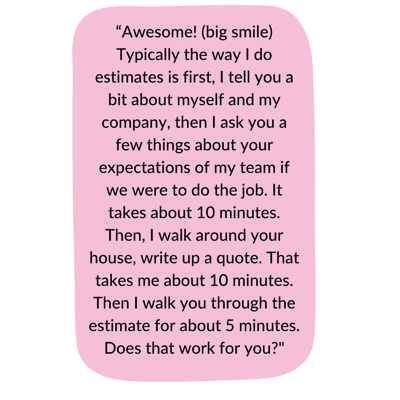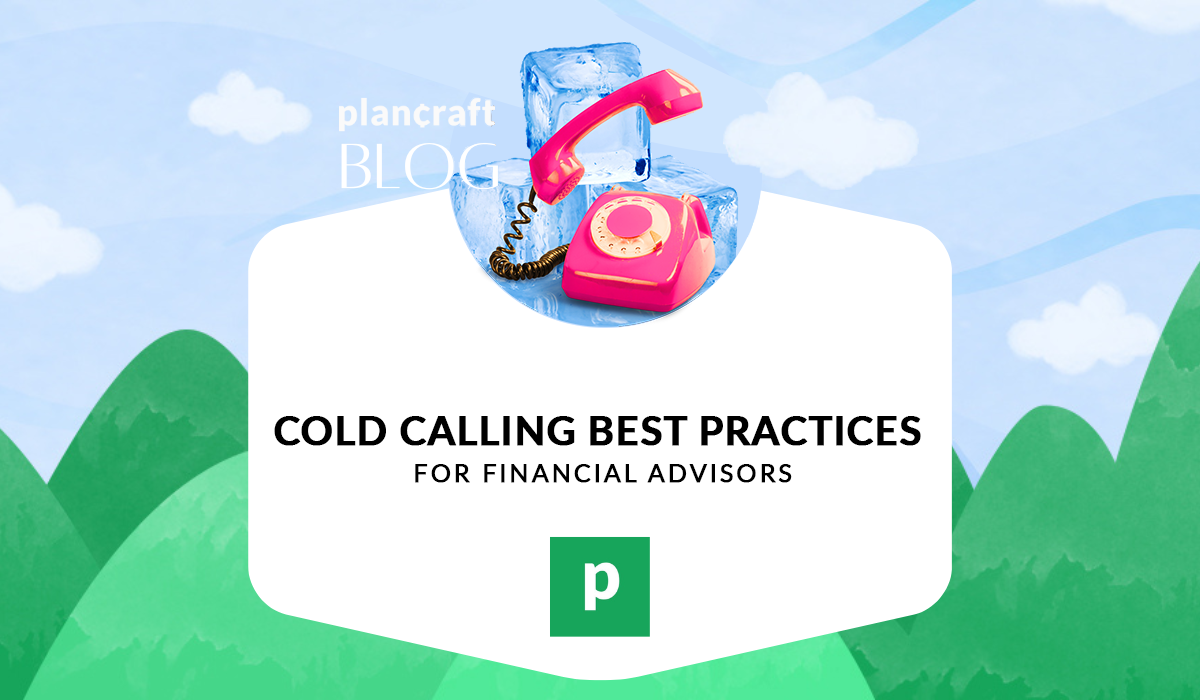 If you're a financial advisor whose business depends on making sales calls and you haven't heard of Eric Arnold, you're probably leaving many prospective clients on the table.
If you're a financial advisor whose business depends on making sales calls and you haven't heard of Eric Arnold, you're probably leaving many prospective clients on the table.
Eric, Planswell’s CEO, cut his teeth by closing sales at a 95% rate when he started his own window cleaning business in college.
Although he was selling door-to-door at the time, the tactics he developed work like a charm when making sales calls too. The ability to sell is perhaps the most valuable transferable skill, after all.
Eric details his seven-step foolproof sales process in his book How to Close at 95%: Sales Wisdom from the Front Lines. This isn't some gimmicky hoax full of regurgitated sales tactics for financial advisors. No, it's a legitimate process you can use to close sales more effectively than you'd ever imagine.
You can download it as an ebook for free by clicking on the title, and read on for some key takeaways on how to close more sales.
1) Build rapport rapidly
Whether you're on a phone sales call or knocking on someone's door, you're going to have about five seconds to convince a prospective client to engage with you.
Back in the day, Eric made it a point to notice at least one aspect of the prospect's house he could compliment while he was jogging up to their door — if he couldn't think of something, he wouldn't even knock.
The idea here is twofold: first, if he couldn't "find something about their home’s exterior or entranceway worthy of paying them a sincere compliment, they obviously don’t give a [$#!%] about their house and aren’t going to pay to clean their windows."
More importantly, however, "everyone loves to be sincerely recognized." The emphasis here is on the word "sincere." People can smell phony compliments about a hundred miles away.
Adapting to phone sales
If you're selling to potential clients over the phone, how could you possibly notice enough about them to pay a sincere compliment within 5 seconds of them answering your call? You won't.
There is, however, a work around: simply ask "how are you?" As phone sales techniques go, this one is fairly simplistic, however, it does require appropriate follow-up in order to lead to success.
Asking someone how they're doing using a sincere and genuine tone of voice will generally lead to them replying with something along the lines of "I'm doing well, how are you?"
Whether they mean it or not, this is going to put them in a positive mood. But you're not done yet.
The secret is to respond to their "and you?" with a generally relatable detail about your recent life that puts you in a good mood. Things like having eaten a yummy breakfast, or gotten a particularly good night's sleep.
Remember to be as specific as possible for relatability's sake.
(The example Eric gives is of a sales person from Hugo Boss telling him she ate a sausage and egg McMuffin which set her up with the right energy for the day.)
Giving the prospect you're calling something concrete with which they can relate to is the best way to make a good impression right at the outset, which is maybe the most important of all the phone sales techniques we'll be discussing today.
2) Explain the logistics
Have you ever found yourself in the middle of a conversation asking yourself how you got here and how much longer this could possibly go on? This is exactly the opposite of how you want a potential customer to feel when you're making a sales call.
So, once you've built your rapport, you should spend just a minute outlining what the rest of the call is going to look like from a logistical standpoint.
Here's the example Eric gives from his days in window cleaning sales:
Make sure you give them the option to decline. This will establish a social contract, allowing you to pitch without being rushed.
Remind potential clients of the logistical progression of the call at each step. This will help remind prospects where they're at in the process and how much is left. As Eric says, "people love logistics."
3) Go fly fishing
Not literally. This is how Eric describes the process by which you continue building rapport with prospective clients through sharing details about yourself.
Script and memorize 8 factoids about yourself you can share with folks on your sales calls.
The scripting and memorizing is important because, if you don't, "you’ll chicken out and shorten it and miss your chance to hit an amazing connection." This is where the fly fishing metaphor comes into play.
Each detail about yourself, Eric says, is like a new cast of the line. You're hoping for a "bite" in the form of some sort of acknowledgement or recognition from the prospect with whom you're speaking.
That's why 8 is the magic number: it's enough to build a connection over something, but not so much that it's going to take you two whole minutes to explain.
Caveat:
Avoid the temptation to unload details from your resume onto a prospect.
"Your accomplishments," Eric says, "graduate degrees, letters behind your name, specializations. Those suck. The chances of the person you’re talking to relating to them are very low, and if they do, they’re probably your competitor."
So, make sure to stick to the relatable stuff: who you are, where you're from, what kind of life you live.
4) Analyze need
The next step is to initiate a series of questions about the prospect's experiences with previous services. Your goal is to gather as much data about what this person believes makes great — and terrible — service.
It is going to get "unbelievably awkward" before this step is complete, so get ready.
The "need" you're analyzing here is not, for example, what level of insurance coverage this person needs, but what they expect of you from a service standpoint.
Dig deep to find out exactly what you need to do in order to provide this person with the kind of service that will not only result in their being a satisfied customer, but their referral of you to their peers.
Sample questions
Here's a list of sample questions Eric recommends asking:
- What did you like about the team who did the work for you?
- What could have been better?
- What about other service providers? What have you liked and disliked?
- What's the best experience you've ever had with someone doing work for you?
- What about the worst?
Throughout this whole line of questioning, you should be alternating between asking about positive and negative stories, and taking copious notes.
The goal is to get the prospect to think to themselves "why the hell are you asking me about my cable guy?!" Why? So you can deliver what Eric deems to be the most powerful line in his sales arsenal:
"The reason I ask all of this is to understand your expectations, so I can make sure you’re enthusiastically satisfied with my team when we come to do the work."
This line informs a prospect you care, you’re listening, and you’re prepared to meet and exceed their expectations.
Pitfall alert!
Don't try to close the sale at this point. It won't go well. At this point, you should "meet their needs with nothing more than empathy."
You're taking notes and learning a lot. You'll use it later, don't worry.
5) Presentation
Whether making a sales phone call or knocking on someone's door to sell them windows, the way in which you present your offer of service is going to make a huge impact on whether or not you close a sale.
If you follow Eric's process, this is where all those copious notes you've been taking are going to come into play.
Compliment first
First, start with a compliment. If you've been walking around someone's house to quote window cleaning, that's one thing. But, if you're on a sales phone call as a financial advisor, you might have to figure something else out.
(BONUS: If you're a Planswell partner advisor, you'll have access to more than 40 data points on the households you call, including the free financial plan they made on our site, so you'll have plenty of material.)
Price, price baby
After the initial compliment, Eric recommends leading off with the price. It's going to be the first question they have, and if you try to talk about other things, they're just going to be distracted wondering how much your service will cost.
The most important thing, however, is to include the list they gave you of everything they've loved and hated from service providers they've worked with in the past.
Read it back to them — in the language they used — as a list of things you will and will not do, and offer them a 100% enthusiastic satisfaction guarantee.
Done right, this step functions as both a mirror and an anchor. They will see you as the ideal provider and associate you with the best memories they have when it comes to being satisfied by service providers.
6) Ask for their business
It seems almost so simple as to not need mentioning, but many people hand out the estimate and then walk away.
Show the prospect your schedule and ask them when they would like to get started.
Also worth noting: the question "when would you like to get started?" is much more effective than "would you like to get started." (Don’t give them an easy, one-word out.)
7) Tentative close
Often the situation comes up where the prospect you're speaking to won't want to commit right away. They'll need some time to decide, or want to speak with a spouse first, or have to check their schedule and get back to you.
You probably already know this, but if you don't close the sale at this stage, the likelihood of them calling back is mind-bogglingly low.
Eric, however, has a solution:
Tell them you understand they can't make a full commitment, however, your schedule is filling up and in order to ensure they are able to take advantage of your services, you'd like to just pencil them in. If they decide later it's not right for them, they're welcome to call back and cancel, no questions asked.
The specific question "is there any chance you might want to have your windows cleaned?" (obviously replacing window cleaning with financial advising in your case) is a great way to get them to say yes and agree to pencil something in.
If they do, the likelihood of them calling back to cancel are just as low as the likelihood they'd call back to book something later.
Whatever the potential client chooses at this moment, they are going to end up feeling it is the right choice.
BONUS: Qualify prospects
This is more of a philosophy than a phone sales technique, but it's important either way.
Here's the idea: you don't actually want a 100% close rate.
This might sound preposterous, but it's true. If you close every single sale, the likelihood is you're converting calls which have very little chance of resulting in a happy customer.
Eric actually made a rule for himself: if he did not absolutely nail the first four steps in his process, he'd walk away.
If you can't build the rapport, if you can't agree on logistics, if you can't engage them on hot button topics related to their perception of excellent service, chances are this is not going to be a customer you want to be working with. You should move on to the next call.
You'll do yourself a lot of favors (and save a ton of time) if you allow yourself to vet a potential customer before pitching to them.
BONUS 2: Teaching leads to learning
Whether we're talking about sales over the phone or writing a blog post about sales over the phone (or any other skill, really), the best way to get better at something is to teach others how to do it.
Eric realized this in his second year of selling window cleaning. He trained 9 others in the art of selling and outsold them all put together. Even though they didn't achieve the success he'd hoped they would, he was able to boost his own ability to close a sale significantly.
So, if you're feeling like your familiarity with this system isn't quite where you'd like it to be, share the love! Teach someone else these steps, and your own execution of them will certainly improve.
Read the e-book
If this all sounds interesting, or even if it sounds too good to be true, you should definitely take a look at Eric's e-book on the subject.
It's only 18 pages long, but goes into more detail on how to use the power of conversation to quickly build rapport with customers and close more deals than you ever thought possible.
The best part is, it's free!
Check it out and happy selling!







.png)

